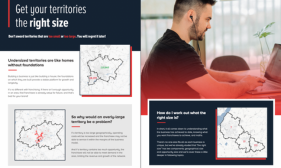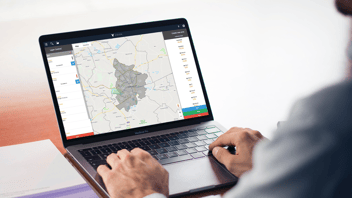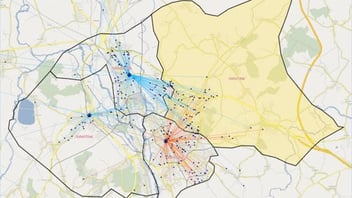August 12, 2023
Many franchisors will begin the territory mapping journey by creating territories ad-hoc each time there is a prospective franchisee interested in an area. In the early stages, this appears to be the way to go about things, but there are hidden dangers to consider for your franchise as it develops.
When a franchisee enquires about buying a franchise and there is no defined territory for you to award, then immediately the territory becomes a component of the franchise agreement to be negotiated. It can be assumed that most franchisees will enter the territory negotiation aiming to come out with a deal most suitable to their current situation. Though at first, this seems like the right thing to do, it can actually have a negative impact on the future scalability of your franchise.
Very often the territory created ad-hoc for a franchisee (especially in the early stages) is too large an operational area for the franchisee to effectively service. This is due to a number of factors which can often include:
- As the franchisor you want to make sure there is enough commercial opportunity in the area, perhaps admirably you aren’t concerned about the number of franchisees you have but are concerned about how well each one does.
- If the territory in negotiation is one of your early territories, you don’t want to scare the franchisee off by limiting how well the business will fit around their lifestyle.
- You aren’t sure how you should go about creating a UK network of territories, it can appear to be a very daunting task!
Though some of these scenarios don’t seem likely to cause issues for your franchise, especially as they tend to be very franchisee beneficial and therefore represent an ethical franchisor, there are definitely issues that impact your ability to grow your franchise and support the franchise network.
Giving away too much commercial opportunity
This is a very common issue with many franchisors, at Atlas Mapping we term “legacy” territories as territories that have been created in the early conception of the franchise and continue to bear a headache for the developed franchise of any size.
When a territory is too large a franchisee is actually not able to service all of the commercial opportunity held within it. This not only relates to the geographic size but also the number of potential customers. The best way to relate to this is to ask yourself the question, why am I franchising in the first place? Franchising is a method of expansion for your business, often because it is not practical to keep growing your business organically. So why should you sell a territory to a franchisee that asks them to create a business many times larger than the original one you created for yourself?*
The end result of doing this is that the franchisee cannot satisfy the demand in the territory and as a franchisor this represents a number of challenges for you:
- You will be aware that there is plenty of opportunity in a territory that a franchisee isn’t maximising. But because the territory is held within an agreement it is extremely difficult and costly to negotiate putting parts of the territory back onto the market.
- You will have great potential franchisees knocking down your door to join the network but all of the best places will be taken, even though only half of it is actually being serviced!
- Because you have too few franchisees servicing the total opportunity that has been awarded, the growth of your brand and franchise is hugely stunted for the entire length of the franchise agreement which is often at least 5 years.
In the long term, an approach that appeared flexible and with the franchisees’ best interests at heart, has actually created a “glass ceiling” of network development. You will be able to see all of the opportunity left available to you but it is locked away within territories, and great potential franchisees that you would like to bring on board are unfortunately being turned away.
The space left in between territories
One of the most limiting outcomes from ad-hoc territory design is that very often irregular shapes and “slivers” of geography are left in between the existing territories. Even when a professional supplier is used as support for ad-hoc territory design, it is almost impossible to factor in the knock on effect of creating a bespoke territory.
What tends to happen is that each franchisee’s territory is tailored to suit their home location and their ability to service the surrounding area. All too often, however, a franchisee lives in a more suburban or rural area and therefore actually lives a moderate distance from the largest clusters of potential customers. The theory behind this has some stock to it, a franchisee is likely to live in a more wealthy area and therefore likely to be situated outside of the city and town centres.
Eventually, though a franchisee is investing their own money into your business it must be accepted that in the interest of the brand not all territories will be perfectly suited to their home location.
Summary
Ultimately ad-hoc territory design is great for helping to get those early franchisees on board and bought into your franchise, but the drawbacks can remain with your franchise for many years. Alternatively, there are other sales methods that could be used to help bring those franchisees on board, for example perhaps awarding a neighbouring territory for future development as part of the franchise deal, so long as the franchisee achieves the minimum expectations within their “core” territory.
There is a wide range of varying scenarios and challenges to face during the franchise negotiation process, it’s important to understand all of the aspects of the relationship you are entering with the franchisee. If you can take these considerations and be mindful of the long-term goals for your territory network, then your franchise will have the greatest chance to flourish with more franchisees reaping the rewards of operating a successful business.
*Your best franchisees will likely own multiple territories and actually will grow extremely credible businesses. The point is that every franchisee in your network is unlikely to be of this calibre or mindset





